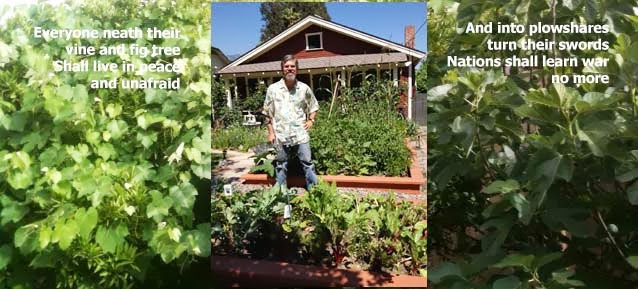On December 17, 2018, Mayor
Terry Tornek recommended that the city-owned YWCA, located next to City Hall,
be used to house our homeless neighbors, many of whom live on the nearby
streets. He noted that Centennial Place, the former YMCA adjacent to the YWCA,
houses 144 homeless individuals and is what he calls a "good
neighbor."
Advocates such as the
Greater Pasadena Affordable Housing Group (GPAHG) , the Faith Partnership to
End Homelessness, and community leaders listed below, applaud the Mayor's
recommendation. We believe that this property should be preserved and restored to
its original intent—a home for those in need.
On
Wednesday, February 20, some Centennial Place residents and community activists
held a candlelight vigil at the YWCA, praying that this property be used for
God's intention, just as people prayed at Heritage Square South, where 60-70 units
for homeless seniors were approved in December 2018.
Some history: This YWCA was designed
by famed architect Julia Morgan, best known for designing Hearst Castle. She
also had a heart for the poor and vulnerable and designed several YWCAs. Built
in 1921, Pasadena’s
historic YWCA has sat vacant for over 18 years. In 2012 the City of Pasadena,
concerned about the lack of care and maintenance, invoked eminent domain, purchased
the building and later began negotiations to convert the building as part of a
proposed a 180-room Kimpton hotel. A huge
pushback ensued from the community and in 2017 the City Council unanimously
rejected the Kimpton Hotel concept.
Why Supportive Housing?
Using this YWCA for supportive
housing makes sense. Fortunately, funding is available for this purpose from
federal, state and county sources. This would meet a desperate need for
homeless housing in the City, especially around the City center. According to
the 2018 homeless count:
·
677 people in Pasadena are homeless.
·
462 are living on the street.
·
104 are in families.
·
70% are men, 29+% women, <1 o:p="" other="">
Since the YWCA is across the street
from Centennial Place, and since Union Station Homeless Services works with
Centennial Place, Union Station could work more efficiently in both locations.
Union Station has had over 45 years of experience successfully addressing
homelessness in Pasadena and would commit to quality services and ensure
permanent stability for residents
What are the Possibilities?
Historic
Restoration –The developer should have experience and a successful
track record in preserving historic buildings. Historic Resources Group,
located here in Pasadena, could be hired to ensure its historic character is
preserved.
Historic Preservation Stakeholders such as the
Pasadena Heritage could to ensure that if any new structures are built on the
surface parking lot, they would be respectful of the YWCA’s historic
significance and architecture. The Rosalyn Hotel in Los Angeles is an excellent
example of an historic site repurposed to help house those in need.
Economic Development – In order to incorporate an economic
development component, we propose the inclusion of a social benefit enterprise like
a restaurant that would provide training/job skills to the residents of the YWCA,
Centennial Place and other low-income individuals. Catalyst Kitchens and Homegirl
Café are examples of successful enterprises.
Creating affordable housing brings
economic benefits to the City. Developers of affordable and homeless housing in
Pasadena are required to hire at least 20% of their workers, 20% of contractors
locally and to purchase at least 20% of their supplies locally. Commercial
developers do not have this same requirement. Heritage Square North generated
over $6 million dollars into the Pasadena economy due to this policy. Another
alternative is that the City of Pasadena
could relocate some of its five of- site office locations to this building. Since the City owns this property, it would not need to lease on another site.
Open Space – It is essential that we preserve public open space on the
eastside of the YWCA. We would only support a proposal that preserves the green
space associated with the Robinson statutes and the Sister City trees. A new
building, if added only be built on the surface parking lot on the south side
of the YWCA lot.
This proposal ensures that YWCA would
remain a landmark in the city, while meeting a genuine need– a fitting tribute
that honors YWCA’s concern for vulnerable
people as well as the Pasadena’s community spirit and compassion. We urge the Pasadena City Council to restore
this historic YWCA, embracing the intent for which it was originally built and
thereby helping to solve our City’s growing homelessness crisis.
Thanks you
for your consideration of our proposal,
·
Pastor Sandy Olewine, First United Methodist Church of Pasadena
·
Rabbi Joshua Levine Grater, Friends In Deed
·
Pastor Jon Stewart, New Guiding Light Missionary Baptist Church
·
Pastor Tera Little, Throop Unitarian Church
·
Pastor Connie Milsap, First UMC of Pasadena
·
Cynthia Kirby, First Baptist Church of Pasadena
·
Pastor Dan Davidson, Rose City Church
·
Nora Ames, Throop Unitarian Church
·
Taiji Miyogawa
·
Mercy Young, Fuller Seminary
·
Georgia Daniels, Orange Grove Friends (Quaker) Meeting
·
Gary Bagwell, Orange Grove Friends (Quaker)
Meeting
·
Nina Rivina, Orange Grove Friends (Quaker) Meeting
·
Edie Salisbury. Orange Grove Friends (Quaker) Meeting
·
Sarah Eggers, Orange Grove Friends (Quaker) Meeting
·
Dr. Jill Shook, GPAHG
·
Dr. Anthony Manousos, GPAHG










